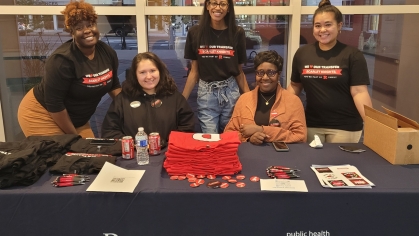Student Basic Needs and New Brunswick Farmers Markets Team Up to Increase Access to Fresh Food
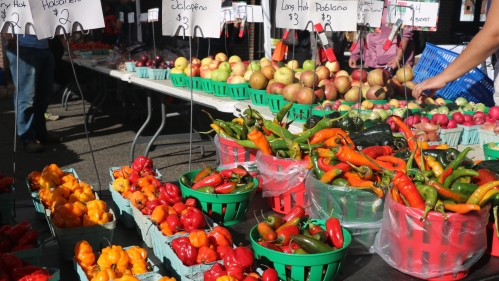
Spring is arriving early this winter, as the New Brunswick Community Farmers Market will be hosting a pop-up at the Busch Student Center International Student Lounge on Wednesday, February 26, from 11 A.M. - 3 P.M.
As with the fall 2024 Farmers Markets, the pop-up will feature fresh food and produce, goods from local vendors, and information about student-centered resources in the Division of Student Affairs. These markets take any SNAP, WIC, WIC FMNP & Senior FMNP, and a gift from Johnson & Johnson provides funding for staff & operations.
While the New Brunswick Community Farmers Markets have been a fixture in the Rutgers—New Brunswick community since 2009, the department of Family and Community Health Sciences (FCHS) in Rutgers Cooperative Extension has only begun hosting Farmers Markets directly on campus in the last two years, in partnership with Student Basic Needs, an area in Off-Campus Life and Community Initiatives (OCLCI).
According to Lucille Tang, who serves as the senior program administrator for Rutgers Against Hunger in FCHS, these new markets are designed to accommodate the needs of college students.
“We want to be as population-focused as possible and attuned to people’s needs,” Tang said. “The biggest barrier to access is being able to find products that are convenient and close to you, and we can hopefully improve folks’ healthy eating behaviors by hosting markets on their campuses.
“Think about it this way: if we didn’t have this market, where would people get their fresh fruits and veggies?”
Staff members from Student Basic Needs also highlighted the importance of these Community Farmers Markets in conjunction with existing resources like the Student Food Pantry.
“In the past, we collaborated with the previous Farmer’s Markets at Rutgers Gardens and in downtown New Brunswick through our Market Bucks program,” said Amber Schreck, who serves as the assistant director for Student Basic Needs.
“With this new initiative, though, we wanted to make sure that students had access to produce, and that they could access both the Student Food Pantry and the Farmers Markets on the same day.”
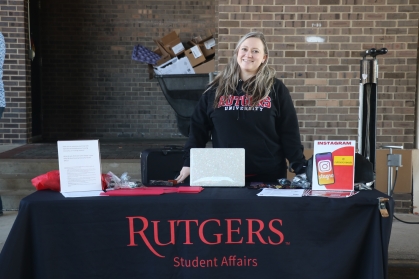
One important collaboration that Schreck highlighted is the Market Bucks program, which gives any student utilizing the Student Food Pantry $10 in Market Bucks that can be used towards any purchase of fruits or vegetables at the Farmers Markets.
While the program has been successful in the past, the introduction of on-campus Farmers Markets has made it even easier for students to access fresh fruits and vegetables: in the Fall 2024 semester, Tang said, the markets received $1500 just in Market Bucks on regular market days.
The Farmers Markets also offer crucial health-related resources. For example, the Rutgers chapter of the American Preventative Screening and Education Association (APSEA) offers health screenings and basic health advice for all attendees at the markets.
“We check blood pressure and interpret their results,” said Eesha Vijaykumar, who serves as the external events coordinator for APSEA. “If needed, we also give them preventative advice on how they can manage their blood pressure with diet, exercise, sleep, and more.”
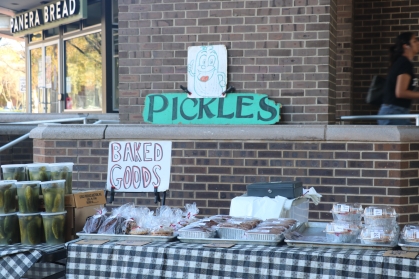
The Fall 2024 Farmers Markets were popular with students, faculty, staff, and community members, who were often excited to learn about the presence of a Farmers Market close to their classes, apartment, or regular commute.
“At this point, we have a lot of returning students to our markets, but we do have a lot of first-time students, faculty, and staff checking us out, too,” Schreck said. “Many of them say, ‘Thank you for this,’ ‘I didn’t know this existed,’ or ‘This is really going to help me eat right.’”
Finally, with the new Student Basic Needs Center set to open this semester in the College Avenue Student Center, Student Basic Needs is hoping to leverage the natural connections between the center and the ongoing Farmers Markets to meet the needs of students. The Student Basic Needs Center will feature an expanded food pantry, a clothing closet, community resources, and much more.
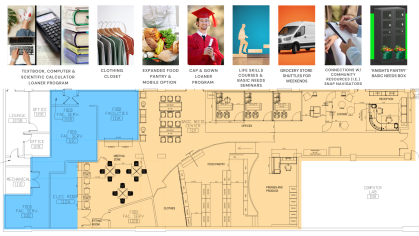
“We’re always looking at ways to expand what we’re able to provide,” said Dr. Philip Smith, who serves as the assistant dean for Student Basic Needs. “We see bringing the Farmers Market to Busch and other campuses as a way to reach students on that campus, to make sure that they are aware of our services and how to utilize our resources on-campus.”
Moving forward, Basic Needs and DFCH will be collaborating to run Farmers Markets on March 12 and April 9 in the Busch Student Center International Student Lounge, and plan to resume many of their other markets on other campuses and in downtown New Brunswick in June.
For more information about the Farmer’s Markets, you can click here. For more information about the new Basic Needs Center, you can click here.

